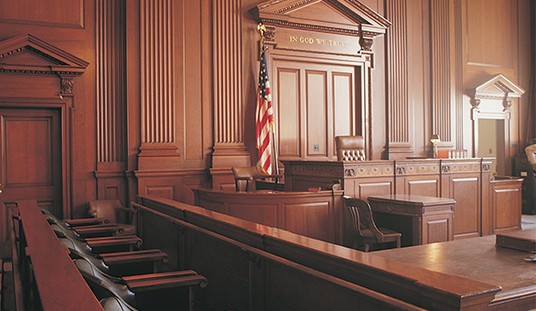The retired three-star general, who commanded the 2004 raid that killed Uday and Qusay, sons of Saddam Hussein, spoke to Human Events Dec. 11 about his recent trip and his meeting with Prime Minister Nouri al-Maliki.
“My sense is the not only could Iraq be a leader in the region, and they are that now, they could be ‘the’ leader in the region,” said Frank Helmick, now the vice-president for corporate strategy at the Reston, Va.-based SOS International. As the commanding general of the Army’s XVIII Airborne Corps, he took his battalion-sized command group its home at Fort Bragg, N.C., to Iraq in January 2011, where it functioned as the military operations echelon for U. S. Forces-Iraq until the end of that year.
Iraq really has it all, he said.
“They have a pretty well educated population,” he said. “In the north, it is the Kansas of Iraq, they grow wheat, barley, grains, rice, tomatoes, potatoes, cotton—everything.”

The strong agricultural base balances their massive oil reserves that produce 2.8 million barrels of oil a day, all of which is protected by stable security forces, he said. “Then, they have something a lot of countries in the region don’t have: they have water.” Not only does Iraq boast the Tigris and Euphrates rivers and marshlands, the world’s ninth largest aquifer sits underneath the former Theater Internment Facility at Camp Bucca in Basra.
“I am optimistic about the country, I have always been optimistic about the country,” he said. “Now, in 2007, 2008, when I was there, there were times when I would scratch my head, of course.”Helmick’s next strip will be to Iraq’s southern province of Basra.
“When I was there, I had the opportunity to speak to Prime Minister Maliki, who I have a great relationship with—it was Julian Setian, the CEO and myself, and we sat down for 45 minutes,” he said.
The message from Maliki was that Iraq is open for business, he said. “He also said that the relationship between the United States and Iraq was very good, which I passed on to U.S. Amb. Robert S. Beecroft, when I saw him.”
The 1976 graduate of the United States Military Academy at West Point, N.Y., said he also met with a number of Iraqi military leaders he had come to know during his tours in their country. “I went to see my old buddies.”

Talking to the Iraqi military leaders made Helmick think that now that the Iraqis have had seen the Americans come and go, they appreciate deeply their contributions to their country and their freedom, he said.
“I went to see all these guys because I do have pretty good relationship with many of the senior Iraqis, just based on my job, one of the sensings I got from those guys—believe it or not, it that America did make a difference,” he said.
“You know, we honored our commitment when we said we were going to leave we left, and I think now they are coming around to the fact that: ‘Gosh, the Americans did a pretty good job. They really helped us—and they really didn’t want to occupy us, they really did want to liberate us,” he said.
“The history books will show that we did have a positive impact on that country,” he said.
A stable and friendly Iraq is vital because it in a geo-political sweet spot, he said.
“If you look at the neighborhood right now, you can see that Iraq is one of the few, if not the only country, that has a semi-elected government—look, it’s not perfect by any stretch of the imagination, but, it’s not a family running the dog gone thing,” he said.
“Talking to everybody, they are doing OK from what I saw, and talking to all the generals, it seems like the security—knock-on-wood– seems OK, but there are flare-ups once-in-a-while,” he said.
“You’re not going to believe this, but at ten o’clock at night, I’m playing soccer with a bunch of Iraqis in downtown Baghdad—it’s nuts,” he said.
“I took it easy on them. I was hurt a little bit, so they made me play goalie,” he said.
“It is not perfect by any stretch of the imagination, but who would have thought in 2003, 2004 that an American general, retired or whatever you want to call itt–now working for a private company, would be playing soccer in downtown Baghdad at ten o’clock at night?” he asked.
All done without battle-rattle.
With its Iraqi business partner, SOSi provides supply-chain logistics, food and fuel, to State Department sites there, he said. These sites include the consulates in Erbil, Basra and the embassy compound in Baghdad.
The State Department no longer operates Provincial Reconstruction Teams in the country, but it does coordinate the advisory services attached to military sales to Iraqi security forces, he said. “There are contracted trainers that are part of the foreign military sales packages that the Iraqis purchased from the United States.”
An example is the Iraqi military purchase of American M-1 Abrams tanks and F-16 fighter jets, he said. The contracted trainers teach the Iraqis how to operate and maintain the equipment, except for the actually flying of the aircraft, which is done in the United States.
Like Iraq, Helmick are making the transition to life without the U.S. Army.
“The Army was the best thing that ever happened to me,” he said.
“I was very fortunate to have bosses that let me make mistakes and help me grow,” he said. “A lot of people complain about their bosses, but I never had a bad boss.”
Since his May 15 Fort Bragg retirement ceremony, where one of his old bosses, retired Army Gen. David H. Petraeus called him a national treasure, Helmick said he has traveled to Afghanistan once and to Iraq twice.
“As a civilian, the first time I landed in Baghdad on a commercial airliner, I looked over to the ‘the military side,’ it was very scarce,” he said. “There were no military planes over there, there were some embassy airplanes, but it was such a surreal feeling to get off your airplane, to go through passport control, to go to the carousel and pick up your luggage and meet your ride and to drive down Route Irish.”
Route Irish is a main thoroughfare and the road that connects Baghdad International Airport with the city proper. There were periods during the American liberation of the Iraqi people that Route Irish was the most dangerous road in the world—a virtual gauntlet of gunfire, bombs and hostile vehicles.
“I can share a lot of stories about guys we lost on Route Irish,” he said.
- Then CIA Director David H. Petraeus embraces Lt. Gen. Frank Helmick at his May 15 retirement ceremony at Fort Bragg, N.C. Helmick twice worked for Petraeus, who is a retired Army four-star general.
(Courtesy)
Helmick said he as he rode through Baghdad and into the city’s International Zone, the whole city was coming to life. “To tell you the truth, the place looks fantastic–I was in shock.”
Although, he has not traveled all over the country, the former commander of the Army’s Ranger School said free enterprise has sprung up wherever he has been in and around Iraq’s capital. “I was very, very pleasantly surprised.” There are now new hotels, markets and businesses in Baghdad to accommodate the growing economy and influx of Westerners.
“There are just new things cropping out of the ground,” he said.
“One of the things they are building is the largest water purification plant in the Middle East,” he said. The general expected to see a facility typical of the make-do nature of Iraqi construction projects. “No, not at all, it looked great. I thought I was in Arizona.” The facility is a modern well-built plant such as what would be normal in the United States.
The general, whose call sign as the commanding general of the XVIII Airborne Corps was: Dragon 6, said he is sure veterans of the Iraq War would be pleased and proud of what the Iraqis are building on the foundation they and our coalition partners laid.
“You think about all of the effort, all the of the lives lost, the thousands of the wounded—that’s why we have to say it was worth it to do what we did,” he said.
Helmick said Army Chief of Staff Gen. George W. Casey Jr., and his successors, would require a general officer to attend the funeral of any soldier killed in combat as his official representative.
“I had the honor of to go to 10 or 11 funerals as the representative of the Chief of Staff of the Army, and at every one of those funerals, every one of them, the father or the mother or the wife or the son or daughter would come up to me and say: ‘General, thank you,’” he said.
“I thought to myself: ‘You’re thanking me?’ They said: ‘Thank you for letting my soldier die doing what he loved to do,’” the general said.
“For those guys, and for those families, it is worth it and we have got to make it worth it, and if you go to Iraq today, you will see that what they have done, you will see that they and we made a difference.”











Join the conversation as a VIP Member